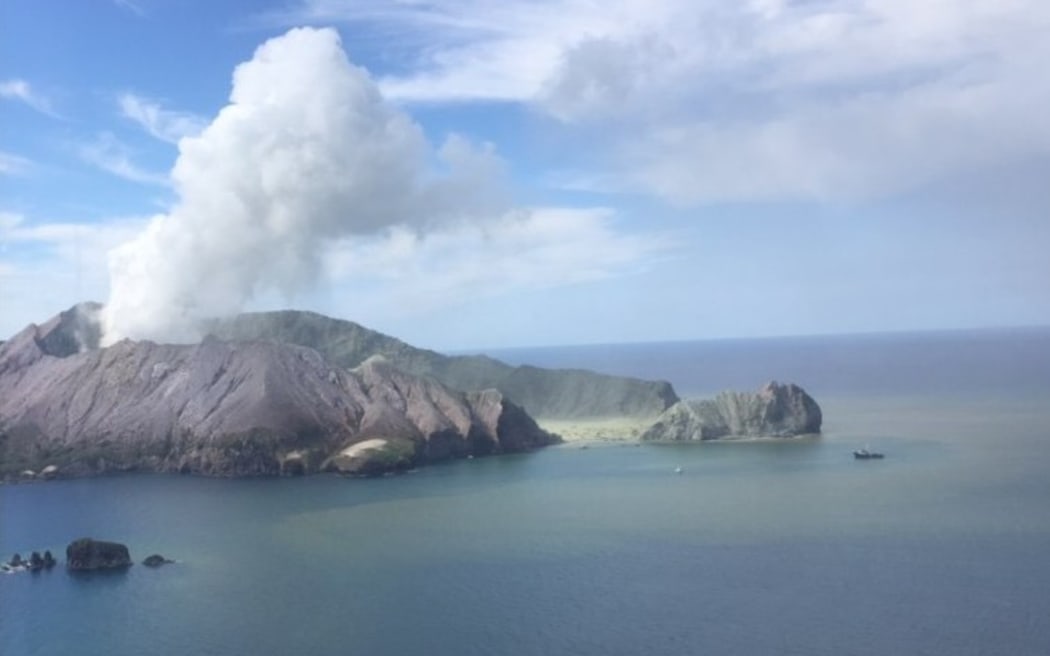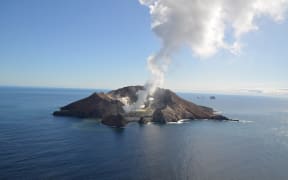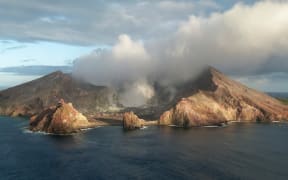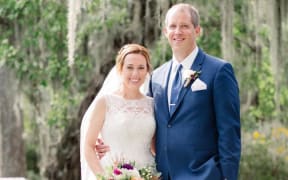
Whakaari/White Island during the eruption in December 2019. Photo: Supplied/Auckland Rescue Helicopter Trust
A leading volcanologist says on the day of the deadly Whakaari White Island eruption, GNS Science did not consider increased volcanic unrest to be a hazard for people visiting.
It is the second week of a trial at the Auckland District Court into health and safety failings in the lead-up to the December 2019 eruption that killed 22 people.
The court was shown a draft volcanic alert bulletin, prepared on the day of the eruption, but not sent to tour operators before the disaster struck.
GNS had kept the alert level at two - meaning there was moderate to heightened volcanic unrest.
"Overall this level of activity remains within the range of expected from moderate to heightened volcanic unrest," the draft alert stated.
"The current level of activity does not pose a clear hazard to island visitors."
The three owners of the island and three companies are facing charges under the Health and Safety at Work Act that allege they failed to take adequate steps to prevent serious injury or death.
GNS Science was among the original 13 individuals and organisations charged but the institute pleaded guilty in May, to a charge relating to its failure to advise helicopter pilots of the risks of visiting Whakaari.
On Friday, its principal scientist Gill Jolly gave evidence in the trial.
Lawyer James Cairney, acting for the owners, asked Dr Jolly under cross examination if GNS got it wrong, the day of the eruption.
"The whole purpose of us doing the quantitative risk assessments was to provide transparent decision making guidance," she said.
"The level of risk at that time, as we calculated it using the best available knowledge, was such that it was within our own organisational limits."
Dr Jolly told the court GNS experts had visited Whakaari five days before the eruption and had planned to install a temporary seismic station days after the eruption.
Cairney asked if GNS, on the day of the eruption, was "comfortable with the risk tolerance for its staff".
Dr Jolly replied that it was.
Cairney told the court "there is an eerie feeling" reading the volcanic alert bulletins sent and prepared in the weeks and days before the disaster.
"However we're tasked with trying to put hindsight to one side and look at what was being said outwardly at that time."
Three weeks before the eruption, GNS had upgraded Whakaari's alert level to two and kept it there.
Just one week before the tragedy, the institute's volcanic alert bulletin reported that volcanic unrest continued with "substantial gas, steam and mud bursts" at the vent located at the back of the crater lake.
It described how Whakaari was "throwing mud and debris 20 to 30 metres into the air above the vent".
But due to the location of the vent, GNS's advisory stated there was no direct hazard to visitors, but that eruptions could occur without warning.
At that time, GNS staff were required to stay further than 520 metres from the vent.
Dr Jolly said its experts considered the island "may be entering a period where eruptive activity is more likely than normal".
By the day of the eruption, GNS estimated the chance of an eruption outside of the crater rim on Whakaari was one in seven, in the next 28 days.
Cairney asked if GNS had told tour operators this, to which Dr Jolly replied it had not.
She said GNS did not make predictions on when an explosive eruption would occur but could give guidance on hazards.
"The judgement about what's intolerable is dependant on the person that's going. And I think something we've not touched on is whether those people that are going know what the level of risk is," Dr Jolly said.
Cairney said it was not about doing something safely, but within their own tolerable risk parameters.
Dr Jolly replied information was key to that decision.
"They both need to know, and they need to understand and they need to make a good judgement on whether that's within their own personal risk tolerance."
GNS licence to visit island revoked
GNS's principal scientist Gill Jolly says its volcanologists have been barred from visiting Whakaari/ White Island by the island's owners despite wanting to resume field trips.
On Friday, Jolly said the insitute was ready to resume field trips to the active volcano but its licence had been revoked.
Lawyer James Cairney, acting for the Buttle trio, asked if GNS had been back since the deadly eruption.
"We have not, no," Dr Jolly said.
He then asked if GNS wanted to start going back.
"We would like to go back yes," she said, then confirmed the Buttles were not letting GNS back to the island.
"And that's because they need to determine all the legal issues around the scope of their duty for GNS and GNS workers out there?," Cairney said.
"As I understand it that's the reason, yes," Dr Jolly said.
"And so GNS's licence permitting it access has in effect been revoked and GNS can't go to the island at the moment," Cairney said.
"Correct," she said.
The trial continues next week.





